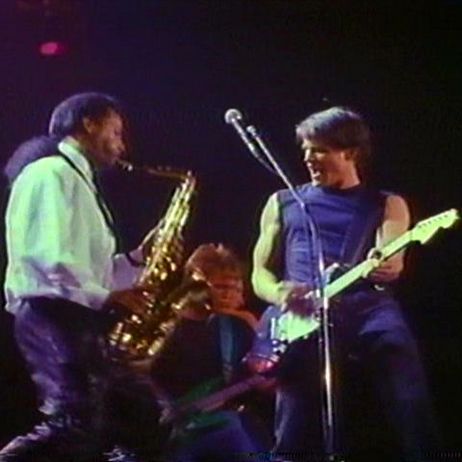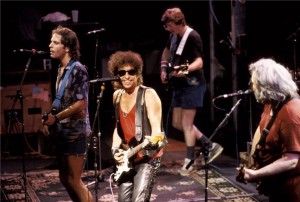
Et tu, Eddie?
Has any rocker ever made music of merit wearing a sleeveless shirt? Not while making music bare-chested or wearing a tank top, not bare-chested under a vest, but specifically making music while wearing a sleeveless shirt.
If you’ve clicked these opening links you’ll see that U2 drummer Larry Mullen has been known to wear the sleeveless shirt. I’ll grant that an argument can be made that U2 made some music of merit while Mullen donned such a gun-bearing fashion atrocity, but he’s a drummer. In past style pieces on Rock Town Hall, drummers have gotten a pass for all sorts of questionable fashion choices, including performing in barefeet and wearing shorts. We make some allowances for rock’s driving forces based on matters of comfort. For the purposes of this survey, we’ll give sleeveless drummers a pass. Beside, I want no part of George Hurley.
Granted, as a guy who’s never expressed his vanity through his forearms (as if I could), the whole sleeveless shirt thing mystifies me. It’s to be expected that the poster boy of Rock Town Hall’s Unfulfilled Fashion Ideas series, Alan Vega, would go sleeveless, but the style would spread to some of the coolest of the cool. How much comfort does a man need to be a rock legend? How much do we really need to know about him? Sure, sometimes even the President of the United States has to stand naked, but did Bob Dylan really need to play sleeveless?

Sleeveless shirt, leather pants, two pairs of shorts...Jerry wins this battle of Best Stage Look!
I don’t know when the sleeveless shirt craze took over, but do a search on a number of rock artists with the date “1985” following their name and I’d bet you can come up with as many shots of them sleeveless as I just did with Dylan. (BTW, I didn’t realize he was into the Bare-Chested Vest Look as early as the mid-’70s, for that Renaldo and Clare movie.) You don’t believe me? Try these:
- “Tom Petty 1985“
- “Peter Buck 1985“
- “Bruce Springsteen 1985“
- “Neil Young 1985“
- “Chrissie Hynde 1985“
- “Joe Strummer 1985“
Strummer, for all his late-period Clash fashion faux pas shouldn’t surprise me, but seeing him in sleeveless shirts still hurts. Make it stop already!
Even a search on Rock Town Hall’s patron saint of mediocrity, “Bob Seger 1985,” turns up this. I pray that’s a bare-chested hippie vest shot and not what it seems.


